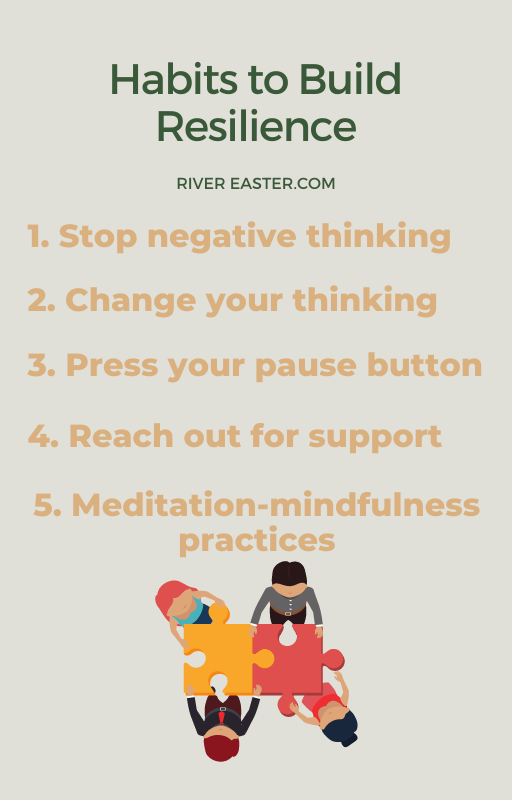Yikes! I received a big and unexpected bill in the mail. How am I going to pay for this?!
You may have experienced a similar situation; maybe your car broke down, or you got an unexpected medical bill, or you’re going through a divorce or breakup.
According to authors Karen Reivich, PhD, and Andrew Shatte, PhD, of The Resilience Factor, most people give up when faced with adversity. They don’t have the confidence to navigate through challenges successfully. Most of us want a break, or we might say, “I can’t deal with this now.” However, what we all know deep down is that life is always going to be full of ups and downs. What we need is more resilience.
What is resilience? According to Reivich and Shatte, it is “the ability to persevere and adapt when things go awry.”
Research shows that resilience is essential for success and happiness in both your personal and work life. Resilience helps you navigate challenges with more confidence, ease, and flexibility. Here is a list of the other benefits of resilience:
- reduces stress and anxiety
- increases your health and well-being
- increases your ability to problem-solve
- increases your focus and productivity
- increases your communication and relationships
- increases your confidence and self-efficacy
Resilience is a skill you can build. Here are three ways that you can begin to develop your resiliency to help you navigate adversity:
1. Reduce your stress and increase relaxation and fun.
Stress is a number one cause of absenteeism and health issues. Research shows that people who are more resilient can handle high-demand, high-stress, and high-performing environments with less stress.
You can reduce your stress through meditation and mindfulness practices. A mindfulness research on high-performing, high-demand environments showed that 12 minutes of mindfulness practice each day maintains performance levels.
Walking in nature helps to reduce stress, along with exercise. Make it a part of your daily habit to take a 10- to 20-minute walk in nature and you will reap not only the benefits of oxygenating your brain but also reducing your stress levels.
We don’t have control over certain situations. What you do have control over are your thoughts and how you respond. Before you panic over adversity, practice pressing your internal pause button before reacting too fast.
I had to pause many times in the past month: my dad had a botched surgery where he lost his cognitive and physical capacities, and then my daughter had high blood pressure that sent her back into the hospital after having her baby.
Why use this pause button? One, because panic doesn’t feel good. It causes us to go down all kinds of scary “What if?” rabbit holes. It decreases functioning in the immune system, disallowing our ability to solve problems or make decisions effectively.
Pressing the pause button and taking three deep breaths supports you in increasing your emotional regulation and, hence, your resilience. Don’t you admire people who are able to handle life under stress with grace and ease?
It is a simple process where you close your eyes, take a deep breath into your belly through your nose, and then exhale through your mouth as if you are blowing out through a straw. This signals to your brain that you are safe. It is a way of recalibrating your nervous system from a state of fight or flight into rest, digest, and create.
You may repeat the breathing until you begin to feel a sense of calm.
I practice this breath often throughout the day. It trains my brain to relax and becomes an automatic response. Once I close my eyes and begin the focused breathing, my body knows to relax.
This practice will help you have more clarity, calm, and focus.

“The reality is that most of us aren’t emotionally or psychologically prepared to handle adversity, which means that instead of facing our problems bravely and confidently, we risk giving up and feeling helpless”
~The Resilience Factor
2. Change or challenge your perception/thinking.
Another strategy to increase your resilience is changing your perception or belief around an event or situation. What thoughts about an event have you suffering (suffering = fear, anxiety, worry, self-doubt). What new thoughts would be empowering? What good or golden nugget could come out of it? Ask yourself: What do I control? What don’t I control? Then focus on what you do have control over.
This is one of my favorite sayings to calm my nervous system:
“The universe works for me. I may not know how right now, but I know it is.”
3. Take meaningful and purposeful action.
Resilient people take action. They are proactive. They are able to face their problems versus avoiding them and all the problems that can cause. Ask yourself, “What is one small action step I can take right now to address this problem?”
Rather than seeing the problem as “bad,” they see the circumstance as an opportunity. They reach out for support to help them. They build relationships rather than feeling isolated and alone. A question you can ask yourself is “What good may come out of this situation?”



